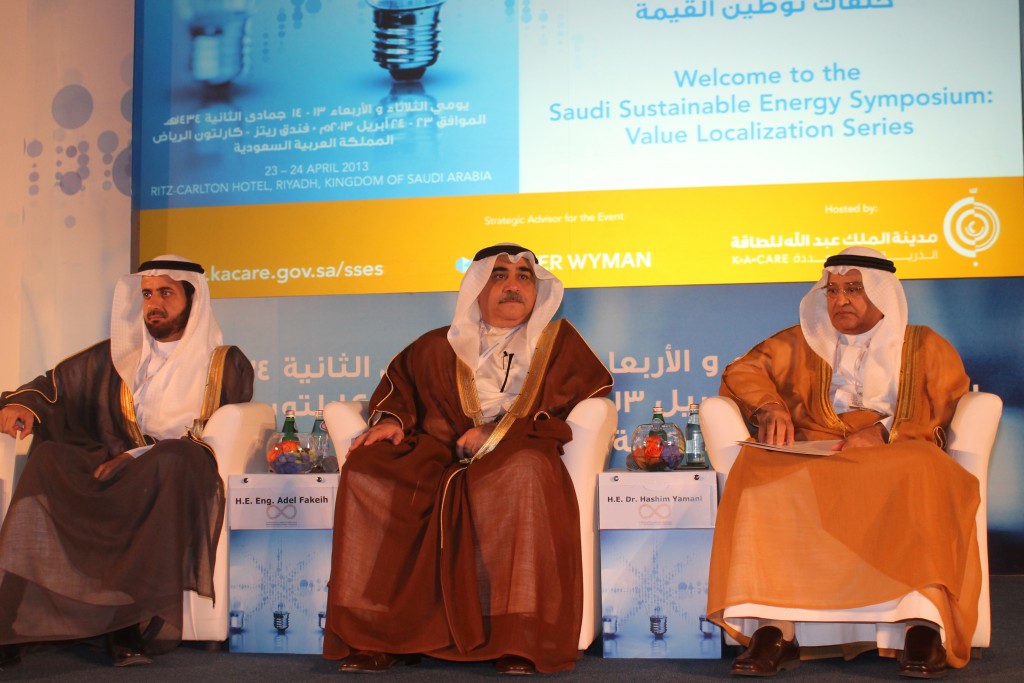The recently-completed Saudi Sustainable Energy Symposium at the Ritz Carlton Riyadh brought high-level officials and companies together to discuss “a common understanding between all stakeholders” concerning the development of the Kingdom of Saudi Arabia’s sustainable energy program, of which nuclear energy is a big part. The event was hosted by the King Abdullah Center for Atomic and Renewable Energy (KACARE) with strategic event partner Oliver Wyman.
With an estimated $112 billion in opportunities in Saudi Arabia’s nuclear sector international companies are actively positioning themselves contracts to build 16 reactors in the coming decades.
But because the United States does not have a full nuclear cooperation agreement with Saudi Arabia, which must be initiated by the executive branch before reaching Congress for approval, U.S. companies stand to lose out big to international firms in the forthcoming Saudi nuclear bonanza.
Congressional Prevention
Section 123 of the U.S. Atomic Energy Act requires “the conclusion of a specific agreement for significant transfers of nuclear material, equipment, or components from the United States to another nation,” which is not yet completed. Despite a visit to Saudi Arabia in November 2012 by a U.S. nuclear industry delegation, including Exelon Generation and others, a 123 agreement with Saudi Arabia remains elusive.
In July 2011, the United States planned talks with Saudi Arabia on civilian nuclear cooperation, a step that “set off fierce criticism on Capitol Hill” from U.S. Republicans. Saudi Arabia signed an agreement with the United States in 2008 during a visit by then president George W. Bush “that would give the kingdom access to enriched uranium — meaning, unlike Iran, it would not need to master the nuclear fuel cycle. But the agreement was only tentative, with little known effort since then to put it into practice, according to the AFP.

H.E. Tawfig Al-Rabiah, Minister of Commerce and Industry, H.E. Eng. Adel Fakeih, Minister of Labor, and H.E. Dr. Hashim Yamani, President, KACARE.
The Iranian Calculation
The reason for Congressional inaction appears to be concern over Saudi Arabia’s intentions with nuclear power vis-à-vis Iran’s enrichment. Namely, the fear that if Iran acquired nuclear weaponry, Saudi Arabia would react by building its own nuclear weapons program. There are indications, however, that this is a miscalculation that could cost corporate revenue abroad and jobs at home.
First, experts deny that Saudi Arabia would inevitably pursue nuclear weaponry. As Colin Kahl, Melissa G. Dalton and Matthew Irvine argue in a February 2013 report for the Center for a New American Security, the prospects “for Saudi reactive proliferation are lower than the conventional wisdom suggests.” The report, entitled ‘Atomic Kingdom: If Iran Builds the Bomb, Will Saudi Arabia Be Next?’ notes that “the view that Saudi Arabia would pursue nuclear weapons if Iran acquires them has been stated so many times by officials and policy experts in Western countries, Israel and the Arab world that it has assumed a certain taken-for-granted quality” but is far from a certainty.
Second, while King Abdullah has reportedly said he will seek its own nuclear protection from Iran if it is ultimately successful in becoming a nuclear power, it is likely to be able to get the weapons, technology, and nuclear fuel from other established nuclear powers regardless of the good intentions of the United States.
Finally, the U.S.-Saudi military and security relationship are at all-time highs. The current sale of $60 bln in fighter jets to Saudi Arabia is the largest in U.S. history, and another $10 in missiles and other military hardware is reportedly on its way after a recent visit by new Secretary of Defense Chuck Hagel to Saudi Arabia. Is the U.S. willing to sell advanced weaponry to Saudi Arabia, a key ally in the fight against terrorism and counterweight to Iran, but not capitalize on private sector business opportunities to help power its crucial Saudi ally in the Gulf region?
Missing Opportunities

KACARE was established in April 2010 “with the fundamental aim of building a sustainable future for Saudi Arabia by developing a substantial alternative energy capacity fully supported by world-class local industries.”
In any case, Saudi Arabia will be pushing ahead with the development of nuclear power for civilian purposes. The Saudi Sustainable Energy Symposium in Riyadh featured all the key industry players including H.E. Dr. Tawfig Al-Rabiah, Minister of Commerce and Industry, H.E. Eng. Adel Fakeih, Minister of Labor, and H.E. Dr. Hashim Yamani, President, KACARE.
The symposium sought to create “a common understanding between all stakeholders including government entities, private sector organizations, local companies, international players, original equipment manufacturers, and potential investors concerning the development of the Kingdom of Saudi Arabia’s sustainable energy program,” and included discussion of local business opportunities for Saudi Arabia’s nuclear sector.
Without a U.S. 123 Agreement, U.S. nuclear companies Westinghouse and GE-Hitachi are in a weaker position for Saudi contracts against companies from France (Areva), Russia (Rusatom Overseas), Japan (Kepco), China (CNNC/China Zhongyuan Engineering Corporation) and the United Kingdom (EDF). For example, no U.S. corporate representatives were panelists on the lunch session “Localization Case Studies in the Nuclear Industry.”
If a 123 Agreement is not achieved, U.S. companies may be forced to look on as international nuclear companies reap the rewards of the forthcoming Saudi nuclear bonanza.
Summary
- U.S. companies not permitted to bid on abundant Saudi Arabian nuclear opportunities because Congress has yet to approve a nuclear pact with Saudi Arabia
- International companies were well represented at a recent major nuclear forum in Riyadh, while U.S. companies were scarce
- Companies from France, China, UK, Japan and others set to pounce on opportunities with KACARE
Lucien Zeigler is research director of SUSTG.










